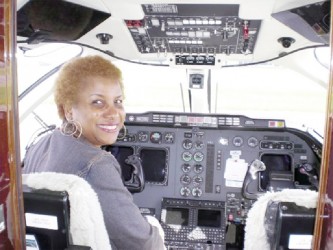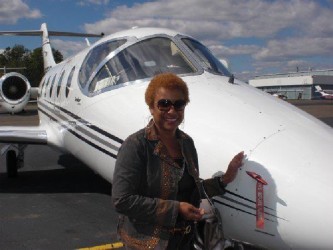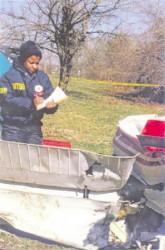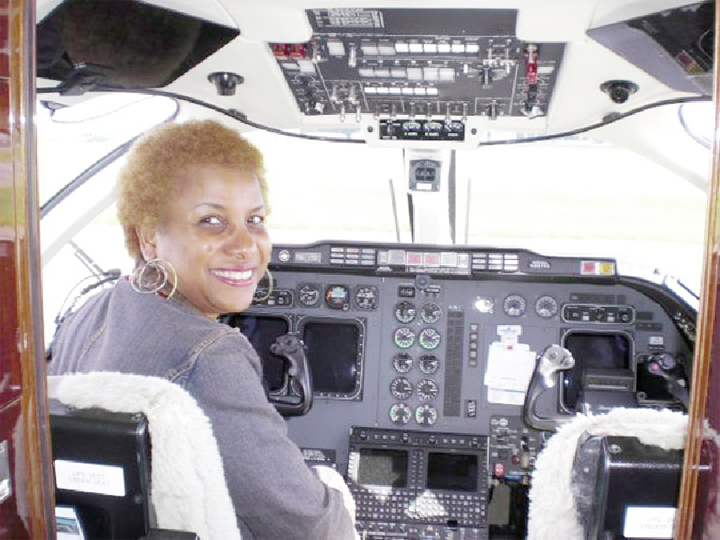Thirty-seven years ago Beverley Drake fulfilled her father’s dream as much as her own, and as he watched his daughter become one of Guyana’s first military pilots, his facial expression reflected his pride and joy.
It was to the same airport Beverley or ‘Bevy’, as her father Clive Drake fondly called her, had gone with her dad when she was young to watch aircraft take off, and she knew from that time that his ultimate dream was to see one of his two daughters achieve what he never could ‒ become a pilot.
“My dad always wanted to be a pilot, but being a black man in the 1940s and not being rich, he never had an opportunity. I think he really wanted one of his daughters to pursue his dream, and as I was the ‘tomboy’ in the family and not scared of heights, I lived his dream!” Beverly told the Sunday Stabroek in an interview from the United States recently.
Her father was her mentor and support throughout the years. It was not an easy road to travel and one of her saddest memories was leaving her mother on a hospital bed to take up studies in the US. Ten days into those studies her mother died never getting the chance to see her daughter become a pilot.
Today Beverley stands tall in the world of aviation and she has several ‘firsts’ to her name, but as she reflects on her past she knows that those trips to the airport were as important as her love for the field of science to making her aviation career a success.
 She is now a Senior Aviation Accident Investigator (SAAI)/Analyst/Federal Women’s Program Manager with the National Transportation Safety Board (NTSB) in the United States and is still the first African American female to date to become an SAAI. In that capacity she has investigated over 300 small and large-scale accidents. She also served as the Witness Group Chairman for USAir Flight 427, and the reconstruction of TWA 800, a 747 that exploded shortly after takeoff in New York in 1996.
She is now a Senior Aviation Accident Investigator (SAAI)/Analyst/Federal Women’s Program Manager with the National Transportation Safety Board (NTSB) in the United States and is still the first African American female to date to become an SAAI. In that capacity she has investigated over 300 small and large-scale accidents. She also served as the Witness Group Chairman for USAir Flight 427, and the reconstruction of TWA 800, a 747 that exploded shortly after takeoff in New York in 1996.
Twenty-two of her 37 years in aviation have been spent at the NTSB but she also had some ‘firsts’ in Guyana, because after she returned from Embry-Riddle Aero-nautical University and joined the Guyana Defence Force she became one of the first military and commercial female pilots to fly the Britten Norman Islander in the jungles of Guyana. She also flew with the Guyana Airways Corporation and as the pilot-in-command, she was the first woman to fly the Twin Otter and Hawker Siddley 748 on both local and Caribbean routes to Trinidad, Barbados and Dominica.
‘Loved airplanes’
Beverley recalls that her dad loved airplanes and he travelled extensively both locally and overseas as he enjoyed flying in and out of the small airports.
“I would accompany him to watch the few departures. It was not a busy airport, but he loved to watch the jets take off,” she recalled.
“You should have seen his face when he showed up at the airport to see his baby girl ‘Bevy’ take off on her first flight after becoming one of Guyana’s first female military pilots.”
 He also had flying magazines and model airplanes at home. “I still have his subscription that he passed on to me before his death in 2008,” she related.
He also had flying magazines and model airplanes at home. “I still have his subscription that he passed on to me before his death in 2008,” she related.
But it was not just her father who played a role in the life of this former Castello Housing Scheme, La Penitence resident, since she also loved cooking with her mother and playing cricket with the neighbourhood boys.
She attended St Pius Primary School and St Rose’s High School and was a science major, so now that she is involved in Science, Technology, Engineering and Mathematics (STEM), she feels very comfortable talking to girls and encouraging them to pursue science degrees.
While her studies commenced at the University of Guyana she later learnt that the authorities were in search of pilots and engineers to pursue a programme at Embry-Riddle Aeronautical University ERAU), and she did not hesitate to apply.
She was nervous when her father drove her to the interview but on the panel was Larry Gillespie, an American who came to Guyana on a contract to work with the government.
“I am still in touch with Mr Gillespie, who is a two star General and lives in the USA. He still remembers the interview and he said he never regretted selecting me for the Guyana Scholarship to attend Embry-Riddle Aeronautical University. He said he had the confidence that I would be successful. I send him and Mr Zulficar Mohammed, the Director of the Civil Aviation Authority in Guyana, daily Flight Safety Updates, which is a document of all incidents and flight information throughout the world that are significant,” Beverley revealed.
She was among nine boys and three girls who were selected to pursue the programme and being the “talkative” one among the group she was named their Liaison Officer and was responsible for working with the school officials and the students so they could be successful. In the end six males and two females became military pilots flying the Britten Norman Islander. Along with three of the men she was selected to fly for the Guyana Airways Corporation and it was there she learned to fly the Twin Otter, DHC 6 and the Hawker Siddley 748 and received her type rating on both turboprop airplanes.
She was successful in her studies but as a 19-year-old going to America for the first time it was not easy Beverley conceded, as not only she did not know what to expect but before she left she went to the hospital to visit her mother who had been admitted following a heart attack, and was in the intensive care unit.
“Her condition had worsened and she was unable to speak. After visiting with my mother, I cried nonstop on the way to the airport. Ten days after arriving in Daytona Beach, Florida, my mother passed.
Although I was new to the university, I had the support of the school officials and the other team members,” she recalled.
 And although they were certificated in the United States when they returned to Guyana Beverley said they still had to obtain a Guyana Civil Aviation licence. She had to travel to Trinidad to study to get her Guyana Commercial Pilot’s licence and go through another round of exams. Those were really tough engineering courses that related to the turbine airplanes she was going to fly. At 20 when she wanted to have fun she had to study hard and she got her type rating on the Twin Otter and Hawker Siddley 748.
And although they were certificated in the United States when they returned to Guyana Beverley said they still had to obtain a Guyana Civil Aviation licence. She had to travel to Trinidad to study to get her Guyana Commercial Pilot’s licence and go through another round of exams. Those were really tough engineering courses that related to the turbine airplanes she was going to fly. At 20 when she wanted to have fun she had to study hard and she got her type rating on the Twin Otter and Hawker Siddley 748.
‘Quite an achievement’
Beverley modestly describes her first international flight as “quite an achievement” but she enjoyed her job and was complimented many times when the passengers saw her sitting in the right seat, as the copilot.
“They could not believe that a woman could fly Twin turbo prop airplanes. I think some of them were scared!”
She first flew for the army and was flying the Britten Norman Islander as a bush pilot, flying without navigational aids over massive jungles.
“It was scary as we had pilots who disappeared and were never found, but I prayed a lot and God spared my life. It is still scary flying over the mountains and I have learned to appreciate the great navigational aids we have in the United States,” she explained.
Initially it was a challenge working with Guyana Airways as the older pilots (who were flying at GAC at that time) did not want to fly with the four new pilots who were seconded to the airline as they were protecting their turf and felt that this would have caused them to receive less pay as they were flying for the army first. They later realized that they had no option.
Her career in Guyana came to an end when she followed her then husband, Randolph Johnson, an army major, to the United States as he wanted to explore other opportunities and he had got an opportunity to go to the US.
It was not easy sailing, and in fact it took years before she got back into aviation as she lived in Brooklyn, New York, but while it was not easy for her to continue flying she was determined not to give up her aviation career, and asked her friends if they knew of any flight schools or flight clubs. She was later introduced to Melva Jackman, the President of the New York, Negro Airmen International Chapter and she joined and later became the secretary of the club. Many of the club’s members owned airplanes and they flew on the weekends and she would borrow her friends’ Piper Arrow or Seneca and take her kids flying.
“My kids enjoyed flying and we would fly to Tuskegee, Alabama and we even flew over Bessie Coleman’s grave to drop flowers on the anniversary of her death. It was an active club and the members loved to fly. I had to make sure I refuelled my friends’ airplanes as they were nice enough to lend me without charging me rental fees. Flying is an expensive hobby and very expensive if you want to stay current,” she revealed.
She wanted to continue flying for a living and even inquired about joining the Air Force, but that was not possible because she was not a citizen and only officers could fly. Her next inquiry was United Airlines; however, they had furloughed pilots and she did not feel comfortable when she heard that.
Instead, she decided to take a diversion and got her first temporary job working on Wall Street until she got her “dream job working at Goldman Sachs in 1984.” She enjoyed working on Wall Street, but when the first financial meltdown occurred in 1987 (Black Monday) she said she realized that it was not that secure and then there was another market crash in 1989 and she decided to focus on getting back into aviation.
She was privileged to meet Dennis Jones, her mentor, at one of the club’s safety meetings, when he spoke to them about ‘Flying Safe’ and told them what the NTSB does. It was then she became interested in working for the Safety Board.
While she works in a male dominated world Beverly said she is pleased that the NTSB does have a few female pilots, some of whom are in key positions in the Office of Aviation Safety. But there is room for many more female pilots. Dennis Jones, who is a senior aviation investigator at the Safety Board spent a lot of time sharing his experiences with her. He is a very dedicated employee and was always supportive of her career, encouraging her to pursue additional aviation courses.
“My dad invested a lot of time taking me to the airport and making model airplanes, and I was pleased to meet someone as dedicated as my dad,” Beverly said.
Giving back
Beverly disclosed that she gives back by going to elementary, middle and high schools to talk to the kids in an effort to let them see that a young girl from the Caribbean can come to America as a young woman, pursue an aviation career, fly as a pilot under scary conditions and still achieve her love and passion.
She encourages women to follow their passion as she was able to do because of the help she received from her father and many others, who made sure that she got an opportunity to learn the skills that were necessary to be successful.
“I followed my father’s dream,” she stated, and other young women should seek out a mentor who has the same love and passion and ask them to help them live their dream.
“I know it is not easy and it is very expensive,” she said, but there is a programme called ACE that she would encourage kids to check out: http://www.faa.gov/education/student_resources/ace_camps/
According to her the programme is good and it is a fun, interactive aviation summer camp geared towards middle-high school students who are interested in aviation and aerospace.
Beverley is divorced with two children, Kevin Johnson (35) and Kurt Johnson (31). She has a Bachelor of Science degree in Aeronautics and a Master’s degree in Aeronautical Science with dual specializations in Management and Operations, from Embry-Riddle Aeronautical University. And she has won many awards during her long and successful career including the Chairman’s ‘Raise the Bar’ award for her outstanding work as Project Manager for the first International Family Assistance Conference.









